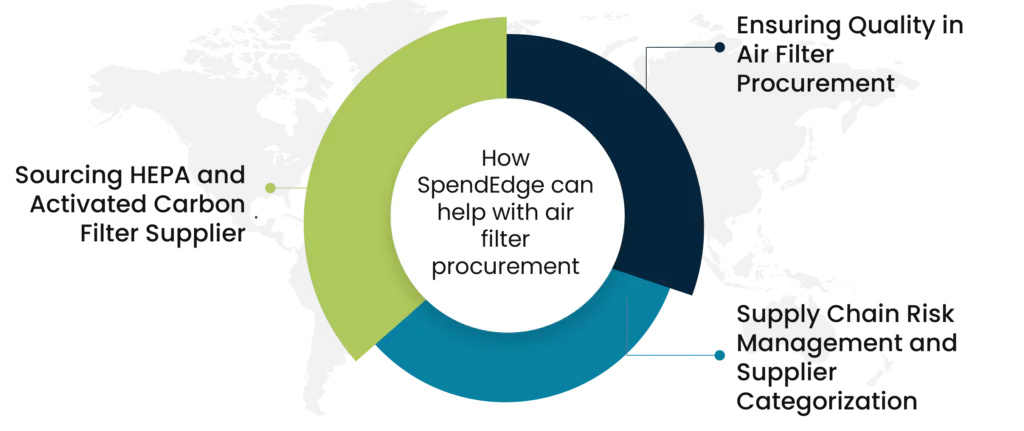By: George Mathew
Global Air Filters Market Size and Overview
In 2022, the global air filter market was valued at US$ 15.2 billion, and it is poised to reach approximately US$ 24.1 billion by 2028, experiencing a remarkable compound annual growth rate (CAGR) of 6.24% from 2023 to 2028.
Air filters offer a multitude of advantages that contribute to the enhancement of air quality and overall well-being. Among their primary merits is their capacity to eliminate airborne contaminants such as dust, pollen, pet dander, and mold spores. By capturing these particles, air filters play a pivotal role in diminishing the presence of allergens in the air, thereby mitigating symptoms for individuals afflicted by allergies or respiratory ailments like asthma. Furthermore, air filters are adept at ensnaring detrimental substances like smoke particles, bacteria, and viruses, effectively fostering a healthier environment and reducing the risk of respiratory infections. This becomes especially crucial in densely populated areas or locales with subpar outdoor air quality.
In addition to their health benefits, air filters also assume a significant role in upholding the cleanliness and efficiency of HVAC systems. They act as a barrier against the accumulation of debris and dust on sensitive components. By ensuring the unimpeded flow of air, air filters augment energy efficiency, thereby curbing energy consumption and the associated expenses. In essence, the advantages of air filters transcend mere air purification, exerting a positive influence on both personal health and environmental sustainability.
Request a proposal for our supplier intelligence solutions to strengthen your supplier base
Demand for Air filters and their application across various sectors
In the early 20th century, air filters were used in heating and ventilation systems, especially in hospitals. In the 1960s and 1970s, urban air pollution led to research and improved filtration technology. Today, air filters are crucial in HVAC systems and have diverse applications.
In residential settings, air filters play a crucial role in maintaining the comfort and health of homeowners. HVAC (Heating, Ventilation, and Air Conditioning) systems employ air filters to cleanse the air of common household irritants such as dust, pet dander, pollen, and mold spores. This ensures that the air inside homes is not only comfortable but also safe for individuals with allergies or respiratory issues.
Large commercial spaces and office buildings rely heavily on HVAC systems equipped with air filters to maintain a healthy working environment. These filters help in controlling airborne particles, preventing the spread of illnesses, and creating a pleasant atmosphere for employees and visitors.
In manufacturing settings, air filters are essential to ensuring the quality of products. Industries such as automotive, aerospace, and electronics manufacturing utilize air filters to eliminate particulate matter, ensuring the integrity of their goods.
Hospitals and healthcare facilities prioritize air quality and patient safety. Specialized HEPA filters and other advanced filtration systems are incorporated into HVAC systems to maintain sterile conditions and reduce the risk of airborne pathogen transmission. These filters are especially vital in operating rooms and isolation units.
Challenges in sourcing and procuring air filters
Effective Supplier Evaluation for Reliable Air Filter Procurement
Identifying and selecting trustworthy suppliers who can deliver the required quantity of air filters on time and within budget can be difficult. This involves assessing their manufacturing capabilities, financial stability, and reputation in the market.
Optimizing Supplier Relationships for Diverse Filter Sourcing: Procurement Consulting Solutions
Procurement and sourcing consulting firm solutions for managing relationships with multiple suppliers, especially when sourcing different types of filters, require effective vendor management strategies.
Crafting Effective Vendor Management Strategies for Diverse Filter Sourcing
Managing relationships with multiple suppliers, especially when sourcing different types of filters, requires effective vendor management strategies.
Start your free trial now to understand how we can help with air filter procurement
How SpendEdge can help with air filter procurement

Strategic Steps for Sourcing HEPA and Activated Carbon Filter Suppliers
Conduct market research to identify potential suppliers. Use industry directories, online platforms, and industry associations to find manufacturers and distributors of HEPA and activated carbon filters
Assess the financial stability of potential suppliers by reviewing their financial statements, credit reports, and payment history with other clients.
Strategies for Ensuring Quality in Air Filter Procurement
Conduct thorough supplier audits and inspections to assess manufacturing processes and quality control systems.
Implement a supplier qualification process that includes quality certifications and performance history evaluations.
Establish clear quality standards and specifications for air filters to ensure consistency and performance.
Proactive Supply Chain Risk Management and Supplier Categorization Strategies
Identify potential risks that could disrupt the supply chain, such as raw material shortages, geopolitical issues, or natural disasters. Develop risk mitigation plans and discuss them with suppliers.
Supplier categorization is based on their criticality and strategic importance. For instance, HEPA filter suppliers and activated carbon filter suppliers may fall into different categories. Allocate more resources and attention to critical suppliers.
The success story of how SpendEdge helped a US-based software company
Our client has a large commercial office building with multiple floors and hundreds of occupants, has recognized the critical need to improve indoor air quality (IAQ) for the health and comfort of its occupants. Specifically, they require a comprehensive filtration solution consisting of both HEPA filters for particulate matter removal and activated carbon filters for odor control. The challenge lies in finding reliable suppliers who can provide both types of filters with the precise specifications required to meet IAQ goals.
Solution provided by SpendEdge:
We begin by conducting an in-depth assessment of the building’s IAQ requirements. This includes assessing the size of HVAC systems, air exchange rates, and specific contaminants in the indoor environment.
Leveraging our extensive network and industry expertise, we identify and qualify suppliers with a proven track record in manufacturing HEPA and activated carbon filters to meet our client’s specifications.
Impact of the SpenEdge solution on our client’s business:
The foremost gain for the client was the improvement in the health and well-being of building occupants. Cleaner air, reduced particulate matter, and effective odor control resulted in fewer respiratory issues, allergies, and discomfort. With healthier occupants, our client has increased employee productivity due to a more conducive work environment, fewer sick days, lower stress levels, and improved cognitive performance. This improvement in workforce health directly contributes to the client’s bottom line through increased employee efficiency and well-being.
For more information on this topic
Author’s Details
George Mathew
Associate Vice President, Sourcing and Procurement Intelligence
George is a procurement specialist at Infiniti Research and provides advisory services to clients across the pharmaceutical, CPG & FMCG, energy, and automotive sectors. He specializes in the procurement areas of industry benchmarking, cost modeling, rate card benchmarking, negotiation advisory, and supplier intelligence.




